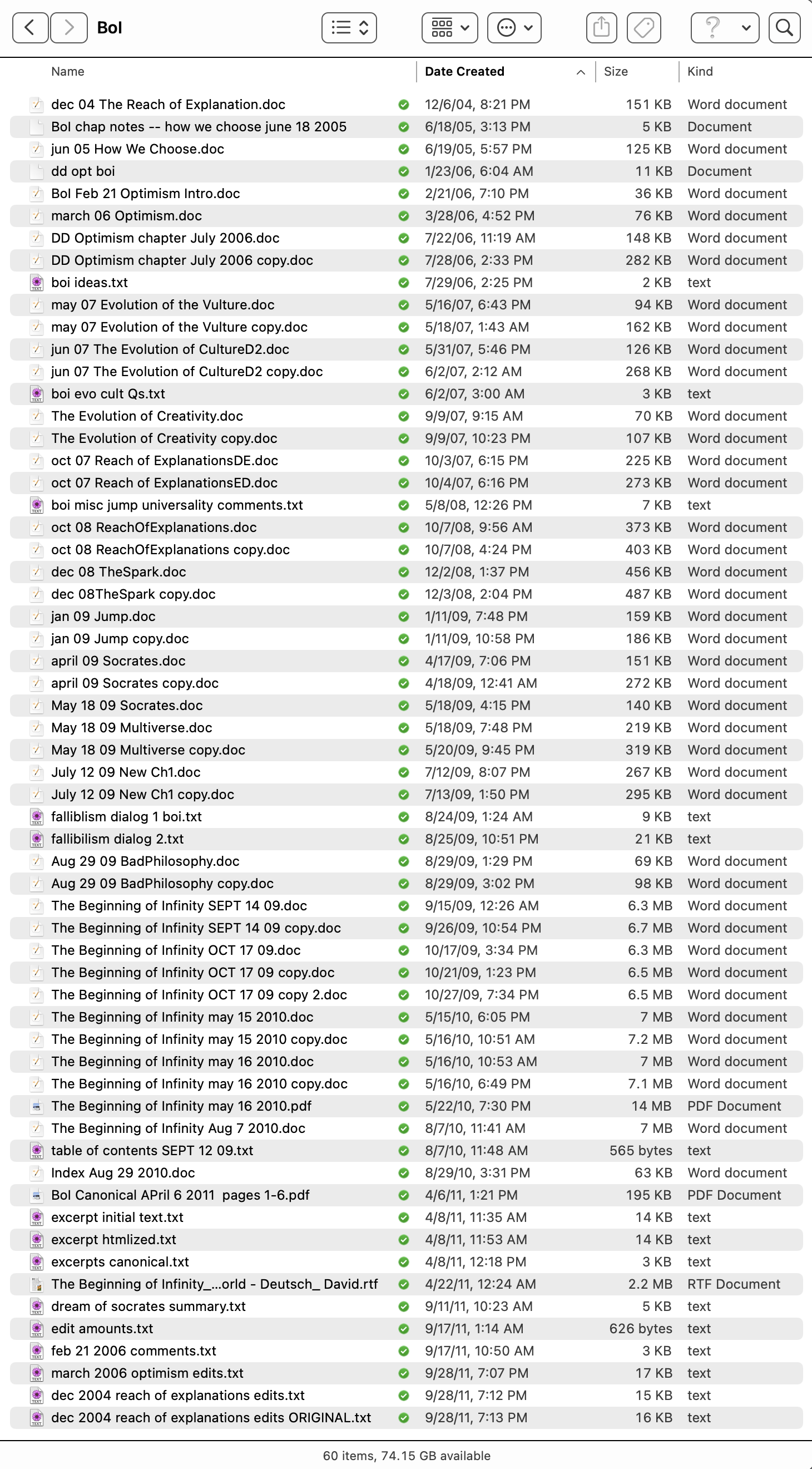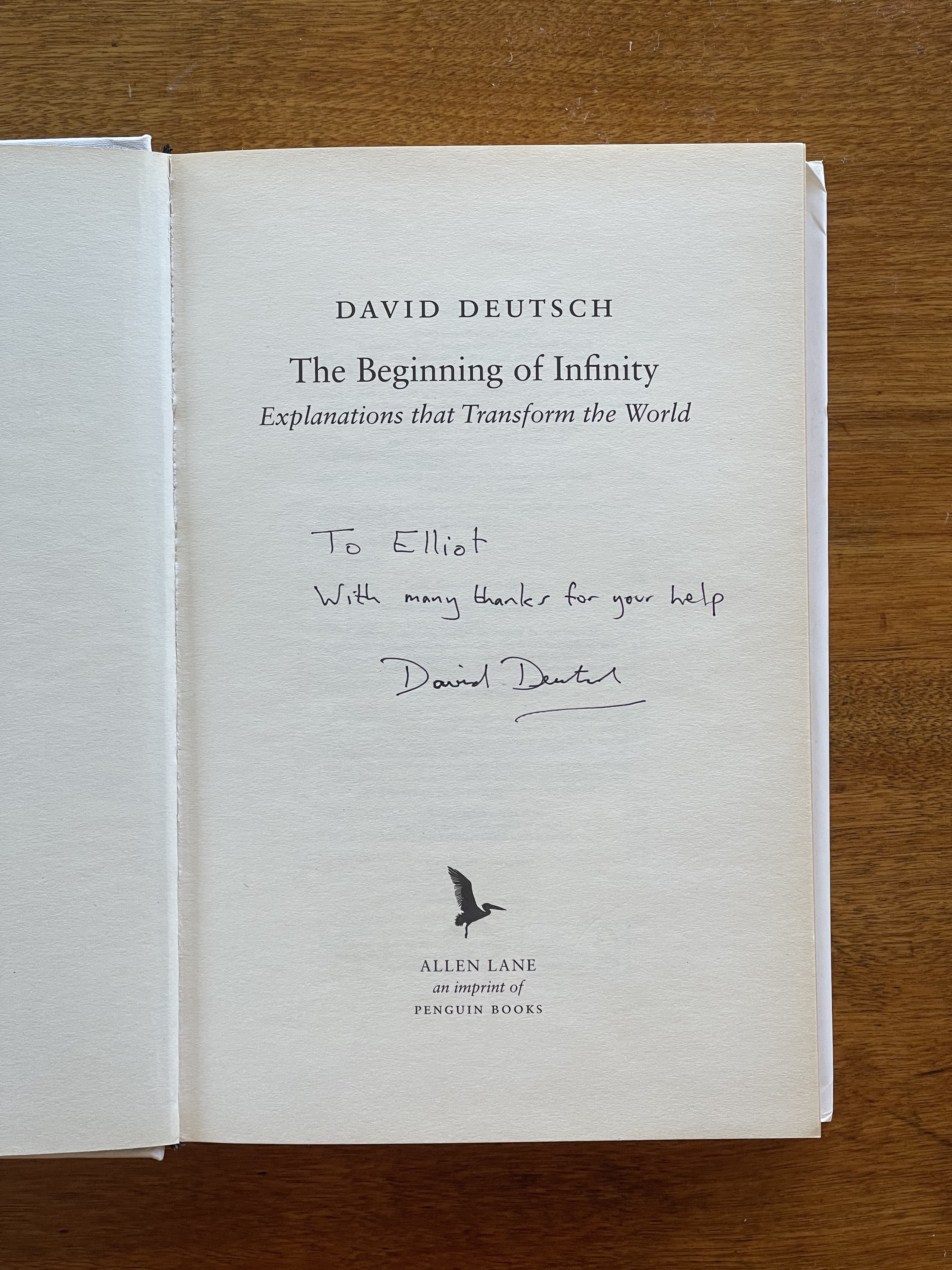I spent around 10 years learning a lot with David Deutsch (DD), and then the next 10 years not interacting with him much. And he mostly stopped putting out public content, so I moved on to engaging with other thinkers. With distance and with greater familiarity with other thinkers and ideas, I’ve reflected on what biases my mentor had and how they were passed on to me and affected me. This is my retrospective from my point of view.
Politics
DD liked politics. He read political news and talked about it a lot. Since I met DD in 2001, the most consistent, organized, serious content creation he ever did was writing around 500 posts for his political blog in around four years. Why didn’t he write articles about philosophy, physics or parenting? Why did he chose politics? I don’t know. I think he was wrong. Being overly interested in current politics is a common error I see with many people who ought to spend more attention and time elsewhere. This error affected me, more in the past, and still a little recently.
Was promoting the Iraq war really a cause DD needed to focus on? If he was just saying everything he thought (which is closer to what I did), that’d be more understandable. But he wasn’t. He was choosing his battles … and he chose the Iraq war as a major one to argue about.
DD didn’t talk about political philosophy or economics much. He wasn’t trying to teach people useful background that would enable them to judge political issues better for themselves. (He did some of that teaching privately with me, and some publicly, but not enough compared to how much he discussed political news.) He frequently spoke about current events and the latest political news. Why? Why is that the best thing to focus on? I think he was wrong. His interests were biased away from stuff with lasting importance or areas where he had the most valuable expertise.
I think being overly focused on current political news generally makes people’s lives worse, and it’s a common problem which I’ve contributed to some. I’ve criticized it, warned people against it, and taken steps to move away from it myself.
Israel
DD likes Israel and defends it in political debates. He often blogged about it. He called it a shining beacon of morality, or some words very similar to that. I agree with him. I didn’t initially. He was fighting against the mainstream media and I didn’t know much about it. But he convinced me pretty quickly. And he kept talking about it on a regular basis, year after year. Why? I think he’s basically right about the topic, and it’s a reasonably important issue, but why not spend that energy teaching me more epistemology? Or writing publicly to refute induction in a better, more organized and persuasive way? Or making videos doing commentary on his or Popper’s books?
How big a place Israel occupies in DD’s mind is a bias which he taught to me. He kept bringing Israel up and made it have an outsized role in our conversations (and on his political blog).
Learning a lot about Israel and how the media treats it unfairly had some value for me (e.g. it helped with understanding how biased and dishonest the mainstream media is), but I don’t think it was the most optimal area to spend that much attention on and write blog posts telling others about.
I don’t think I’ve debated or blogged about Israel for years, so maybe I’ve gotten over this bias.
Polyamory
DD likes polyamory as a concept or abstract theory. Why pay so much attention to it when he wasn’t living that kind of life himself? I don’t know. Maybe because Sarah was into it. Regardless, he got me to pay attention to poly, too, and learn about the subject. Was that useful to me? Not especially. It’s OK. There are many interesting things in the world. Poly was an interesting topic to think about. But was it the best place my attention could have gone? I don’t think so.
Even if polyamory is a theoretically good idea – which I have some substantial doubts about – is it the best use of energy? If you are going to go against your culture on 1-5 major issues in your life, should it be on the list, or are there other things which are a higher priority? I’ll grant that romantic relationships could easily be included on a top 5 important areas list. But the main goal that’s worth the effort should be to avoid disaster (since chronic fighting, broken hearts and divorces are common), not to be poly – which is uncommon, risky and hard. Poly generally doesn’t have major benefits even if it works. And if you have a disaster doing poly, you’ll have a harder time than with a conventional disaster because most people will understand your problem less and be less helpful, sympathetic or supportive.
DD’s and Sarah’s Autonomy Respecting Relationships (ARR) said monogamy is the main problem in people’s relationships. They thought coercion causes all the trouble in both parenting and relationships because all irrationality comes from coercion. And they seemed to think that monogamy was the main source of coercion in romantic relationships. They suggested that if you get rid of the rules and restrictions in parenting or relationships, then people will almost automatically be rational and happy. I disagree.
I’ve been concerned that the poly ideas would hurt people – and that it’d be partly my fault – so I’ve written some stuff and done some podcasts to warn people against it.
Part of why poly can hurt people is mixing it with “rationalism”. If you think you’re super rational and right about everything, and you say monogamous people are attacking autonomy, then you can end up pressuring people to be poly or else you’ll judge them as irrational. I didn’t intentionally pressure people, but some people may have taken it that way, and this kind of theme comes up in multiple rationality-oriented poly communities, e.g. at Less Wrong too. The Less Wrong poly stuff has been a huge disaster that hurt people (I was never involved with that at all; I just read about it online). There are other poly communities that are more like “it works for me; I just wanna do my choice and be left alone not stigmatized” and don’t criticize most people for not being poly, which is less pressuring. ARR told people monogamy was irrational and that not being poly was limiting the growth of knowledge as well as basically opposing freedom and trying to be a jealous coercer, so that was really pressuring.
Discussion
Overrating discussion for learning is a bias DD didn’t have himself (maybe), but passed on to me. I overestimated the availability and value of discussion due to having so much access to valuable discussions with DD. I got used to that and expected it to continue basically forever. I didn’t expect DD to quit discussion. And I expected to find other very smart who were interested in unbounded rational discussion, which is something DD told me was way more realistic than I now think it actually is. Consequently, I overestimated how much emphasis other people should put on discussion in their own lives. And I became overly reliant on discussion myself. Discussion is genuinely important and I’ve given some good reasons and arguments about it, but I also overestimated it.
I also overrated the long term value of discussions with other people who were less awesome than DD. I had lots of discussions that were good at the time, but having more, similar discussions lost value over time as they got more repetitive. I wanted to move on to some more advanced discussions, but it was hard to find discussion partners willing to pursue topics past the more accessible starting points. I didn’t foresee that problem.
I don’t think DD had the same issue as me, but he had some related issues. Most of what he’s written in his life has been discussion replies. He wrote two books in 20+ years and wrote a handful of articles. But he wrote thousands of TCS posts and thousands of other discussion forum posts, and he wrote multiple books worth of private IMs and emails to me. I think he has some perfectionist tendencies that make it hard for him to finish anything for a formal, serious or organized context. It’s easier for him to write for informal, disorganized, incomplete discussion than writing anything for publication or with higher standards or expectations.
DD did write thousands of posts at discussion forums, primarily email lists, but I don’t think he was personally biased in favor of discussion in the same way as me. In most of the posts, he was telling other people his ideas but wasn’t trying to interactively learn from or with them. And he was using the format to excuse imperfections, disorganization and incompleteness, whereas I was treating it more seriously. I actually thought critical discussions were a great way of doing truth seeking.
It was hard, but I’ve put a lot of work into moving away from discussion so that it’s more of an optional bonus for me instead of something central to my philosophy work. Over the last few years, I did a lot of unshared philosophy writing that wasn’t discussion based: it wasn’t prompted by other people’s questions or anything else they said.
Productive discussions require more skill than I realized. My and DD’s communities had a pro-discussion bias because we didn’t recognize how hard it is for people to discuss productively. Interestingly, I think many people also underestimate the skill needed for productive discussion but then reach a different conclusion: an anti-discussion bias. They notice that they don’t get much value from their discussions, so they conclude that discussion isn’t very valuable. They don’t realize how much their discussions could be improved with better discussion methods and skills.

